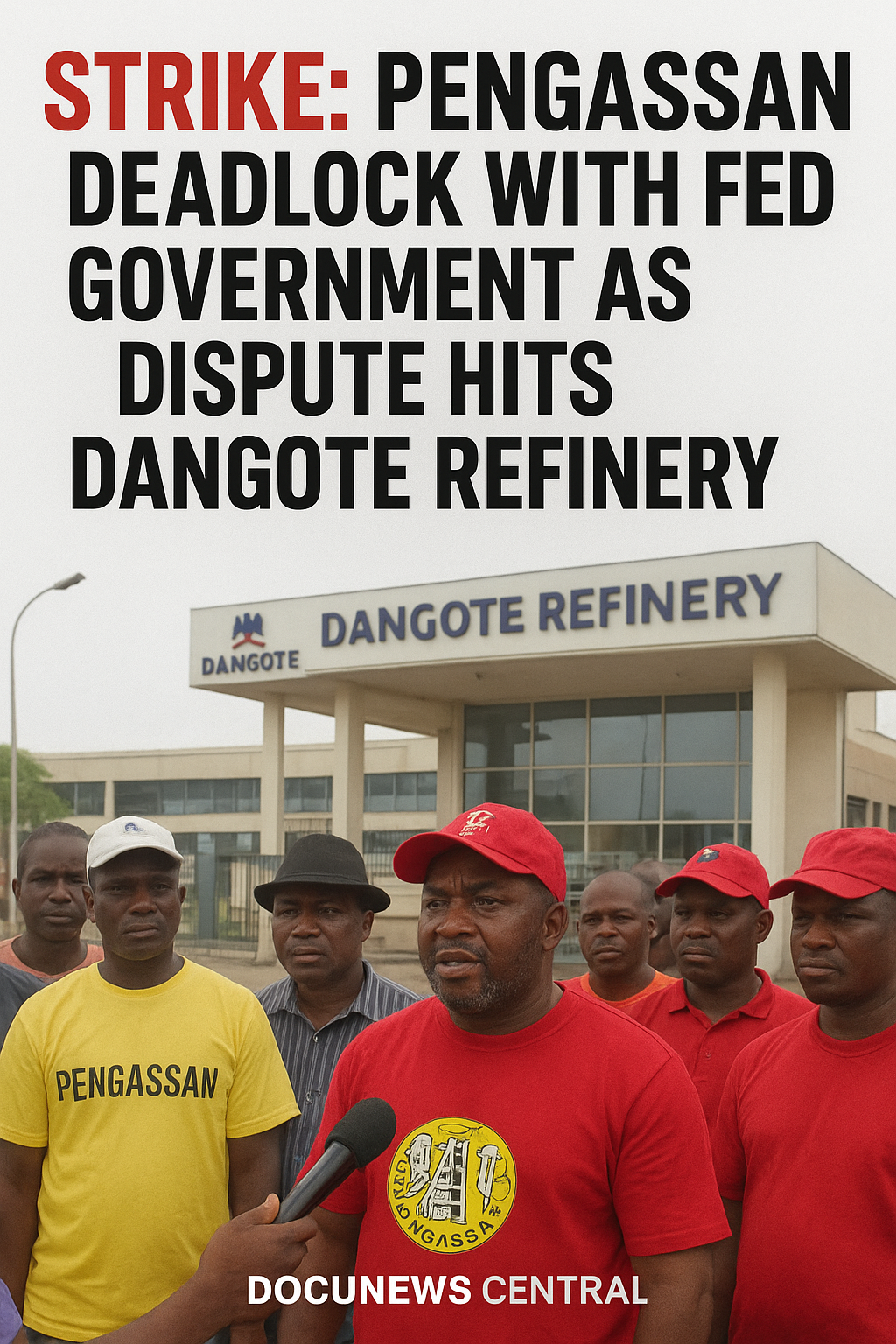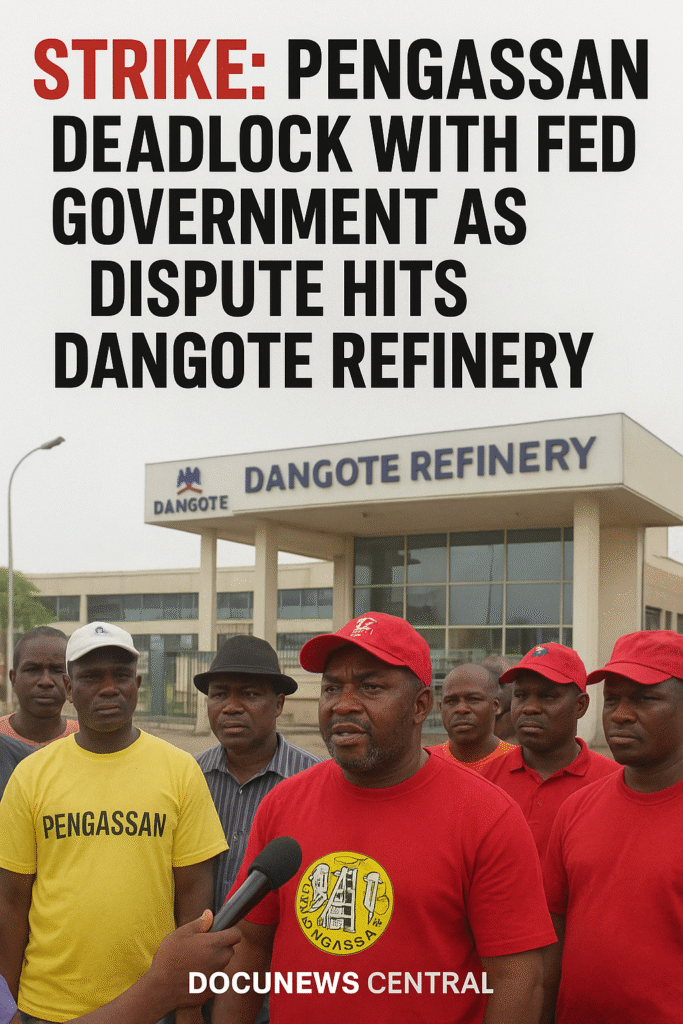

STRIKE: PENGASSAN DEADLOCK WITH FEDERAL GOVERNMENT AS DISPUTE HITS DANGOTE REFINERY
A Crisis That Refuses to End
The Nigerian energy sector has been thrown into deeper uncertainty as the strike by the Petroleum and Natural Gas Senior Staff Association of Nigeria (PENGASSAN) continues to disrupt critical operations. After more than nine hours of tense negotiations and breakout sessions involving the Federal Government, the Dangote Group, and union leaders, talks collapsed in the early hours of Tuesday without a binding agreement. The outcome has left the status of the Dangote Refinery — Africa’s largest single-train oil facility — and the broader petroleum supply chain hanging in the balance.
The Long Night of Negotiations
The conciliation meeting was convened by the Ministry of Labour and Employment in Abuja in response to the nationwide strike order by PENGASSAN. From Monday afternoon until the early hours of Tuesday, representatives of the government, Dangote management, and union executives engaged in heated discussions. Sources at the meeting revealed that several breakout sessions were held in an attempt to soften hardened positions. However, when the final plenary ended, neither side was willing to shift significantly.
PENGASSAN insisted that over 800 workers allegedly dismissed by Dangote Refinery must be reinstated before the strike could be called off. According to the union, those workers were unfairly laid off during what the company described as a restructuring process. For PENGASSAN, the mass sacking represented not only an attack on workers’ rights but also a dangerous precedent that could embolden other companies in the oil and gas sector.
Dangote Group’s Position
On the other side of the negotiating table, the Dangote Group rejected unconditional reinstatement. Its representatives maintained that the restructuring exercise was necessary to ensure efficiency and long-term sustainability of the refinery. They argued that the company had acted within the law and was prepared to defend its decision in court. The Dangote Group did not deny the mass layoff but stressed that the action was a business imperative, not victimization.
This unyielding stance sparked sharp reactions from union leaders, who accused the conglomerate of treating Nigerian workers as disposable while prioritizing corporate profits. The stalemate highlighted the gulf between the parties and made compromise elusive.
Federal Government’s Dilemma
Caught in the middle, the Federal Government struggled to play the role of conciliator. The Minister of Labour urged both parties to consider the national interest, pointing out that disruption of crude and gas supply to the refinery had severe implications for Nigeria’s fragile economy. The Dangote Refinery, with its massive production capacity, is considered critical for reducing dependence on imported petroleum products. Any sustained disruption could undermine national energy security, raise fuel scarcity fears, and trigger price hikes across the country.
Government officials pleaded for restraint, suggesting a phased approach that would allow talks to continue while workers gradually returned to their duties. However, this proposal failed to win acceptance from PENGASSAN, which viewed it as a tactic to weaken union resolve.
The Court Order Factor
Adding another layer of complexity, the National Industrial Court in Abuja had earlier issued an interim order restraining PENGASSAN and its affiliates from halting crude and gas supply to the refinery. The order also barred them from engaging in disruptive actions pending determination of the substantive case. Dangote’s lawyers cited the injunction as grounds for union members to suspend industrial action. But PENGASSAN countered that it had not been formally served with the ruling and therefore considered itself free to continue the strike.
This legal tussle has created uncertainty over enforcement. While the court seeks to restrain the union, the practical reality is that compliance depends on direct engagement with the leadership. Until then, the strike continues to bite.
Impact on Operations and the Economy
The immediate effect of the industrial action has been disruption of crude and gas supply lines to the refinery. Though the facility still has some stock, analysts warn that prolonged disruptions could cripple operations. If refining activities slow down or stall completely, Nigeria could once again face heavy reliance on imported petroleum products. This would counter the government’s vision of achieving self-sufficiency in fuel supply and worsen pressure on foreign exchange reserves.
Experts also note that downstream distribution networks are already on edge. Transporters and marketers fear that reduced output from the refinery could trigger scarcity. Ordinary Nigerians, already grappling with rising living costs, are bracing for another round of fuel price volatility if the strike lingers.
Union’s Stand
PENGASSAN has maintained a defiant tone. Its leaders told members nationwide to stand firm until their demands are met. According to the union, the mass dismissal of 800 staff was not only unlawful but also detrimental to the morale of the workforce. They argue that reinstating the workers would demonstrate respect for labour rights and show that big corporations cannot ride roughshod over Nigerian citizens.
The union also reminded the government of its responsibility to protect workers. They warned that failure to address the crisis decisively could encourage future corporate excesses and weaken industrial relations across the oil and gas sector.
Dangote’s Calculations
For Dangote Refinery, conceding to union pressure might set a precedent that could weaken management authority. Observers say the conglomerate is determined to defend its restructuring policy in court rather than bow to labour demands. However, public perception of the company is now under scrutiny. Critics accuse Dangote of double standards — celebrating the refinery as a symbol of national pride while allegedly disregarding the welfare of Nigerian workers.
The company has not issued a fresh statement since the talks collapsed, but insiders suggest management is monitoring the situation closely while preparing for continued legal battles.
Next Steps
All parties agreed to reconvene at 2 p.m. on Tuesday for fresh talks. The Ministry of Labour hopes that another round of dialogue could yield a breakthrough. However, expectations remain low given the entrenched positions. Until then, the strike remains in force, with ripple effects spreading across the energy value chain.
Broader Implications
The crisis underscores the delicate balance between corporate power, labour rights, and national economic priorities. At stake is not only the future of 800 workers but also the credibility of Nigeria’s industrial relations framework. If the strike persists, the damage could extend beyond the refinery, affecting global perception of Nigeria’s investment climate.
Foreign investors are watching closely. The refinery is touted as a game-changer for Africa’s largest economy, but prolonged industrial unrest could cast doubts on its stability and long-term prospects. Economists warn that if confidence erodes, Nigeria might struggle to attract fresh investment into its vital oil and gas sector.
Conclusion
As the strike grinds on, Nigerians wait anxiously for resolution. For now, fuel supply chains remain vulnerable, the Dangote Refinery’s operations face disruption, and PENGASSAN stands firm on reinstatement demands. The next few days will determine whether compromise is possible or whether the impasse deepens into a prolonged standoff with heavy costs for the nation.






